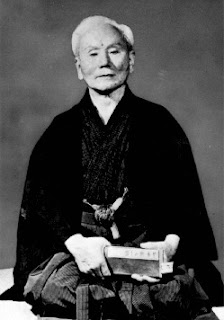Gichin Funakoshi laid out the Twenty
Precepts of Karate,(or Niju kun) which form the foundations of the art, before some
of his students established the JKA. Within these twenty principles, based
heavily on Bushido and Zen, lies the Philosophy
of Shotokan. The principles allude to notions of humility, respect, compassion,
patience, and both an inward and outward calmness. It was Funakoshi's belief
that through Karate practice and observation of these 20 principles, the Karateka
would improve their Person.
1. Karate-do begins with courtesy and ends with rei.
2. There is no first strike in
karate.
3. Karate is an aid to justice.
4. First know yourself before
attempting to know others.
5. Spirit first, technique second.
6. Always be ready to release your
mind.
7. Accidents arise from negligence.
8. Do not think that karate training
is only in the dojo.
9. It will take your entire life to
learn karate, there is no limit.
10. Put your everyday living into
karate and you will find "Myo" (subtle secrets).
11. Karate is like boiling water, if
you do not heat it constantly, it will cool.
12. Do not think that you have to
win, think rather that you do not have to lose.
13. Victory depends on your ability
to distinguish vulnerable points from invulnerable
ones.
14. The outcome of the battle
depends on how you handle weakness and strength.
15. Think of your opponent’s hands
and feet as swords.
16. When you leave home, think that you have numerous
opponents waiting for you.
17. Beginners must master low stance
and posture, natural body positions are for the advanced.
18. Practicing a kata exactly is one
thing, engaging in a real fight is another.
19. Do not forget to correctly apply: strength and weakness
of power, stretching and contraction of the body, and
slowness and speed of techniques.
20. Always think and devise ways to
live the precepts of karate-do every day.
![Author Image]()




















